Frederick Forsyth’s The Shepherd is a novella of man’s instinct for survival. The tale may appear simple, but is actually multi-layered. The account of a pilot who flies a De Havilland Vampire DH100 and becomes lost in disorienting fog, after losing the compass and other instruments due to an electrical failure, turns out to be an intriguing and imaginative ghost story.
Forsyth explains how, in the winter of 1974, his wife asked him to write her a ghost story. According to the writer of The Day of the Jackal, The Odessa File, The Dogs of War, The Fourth Protocol and many other novels, he didn’t know how to write a ghost story. He had never written one before. This classic book, which was published in 1975, contains fifty-two marvelous black and white drawings that gracefully complement Forsyth’s story.
The young R.A.F pilot is stationed in a military base in Germany. The protagonist is excited to fly back home to R.A.F Lakenheath in Suffolk, England, on Christmas Eve. The year is 1957. The pilot anxiously anticipates being reunited with his family in several hours. But first, he must fly his Vampire through a frigid, dark night. The post-World War II date of the story is significant for several reasons. One of these reasons is that the protagonist is not engaged in battle or a military exercise. This enables the writer to develop a story that is centered around the joy of flying , solitude, the pleasure pilots take in being momentarily freed from terrestrial constraints, in addition to the maze of thoughts that pass through a pilot’s head in times of trouble. The author devotes one layer of the story to highlight the beauty of flight and the psyche of pilots. Forsyth, himself a pilot for the R.A.F, flew the De Havilland DH 100 Vampire, a formidable machine capable of reaching a cruising speed of 548 miles per hour.
The Shepherd brings to mind many of the themes found in Antoine de Saint Exupéry’s classic 1939 novel Wind, Sand and Stars, a work which showcases the exploits of the author of The Little Prince during the time Saint Exupery was an airmail pilot for Aéropostale.
Forsyth has his protagonist narrate the joy of flying, as the pilot enjoys time alone in the protective warmth of the Vampire’s cockpit. The narrator is poetic in juxtaposing his solitude, which is conducive for reflection, and the almost make-believe world “down there,” as he experiences the world from an altitude of 5,000 feet: “Down there amid the gaily lit streets the carol singers would be out, knocking on the holly-studded doors to sing Silent Night and collect pfennings for charity. The Westphalian housewives would be preparing hams and geese.”
After climbing to 15,000 feet, the cheer of Christmas – Weihnacht – “it’s the same all over the Christian world,” gives rise to the fifty-six degrees below zero hostility of the lonely night, with the stars “sparkling away there in the timeless, lost infinities of endless space.” The glass canopy of the Vampire affords the pilot a clear view of the crisp stars shimmering in the wintry night. Below, lay the “heavy brutality of the North Sea, waiting to swallow up me and my plane and bury us for endless eternity in a liquid black crypt.” Once airborne, pilots experience a form of timelessness that is difficult to convey to non-fliers.
Discerning readers will notice that the tone of The Shepherd is comparable to the narrative structure and thematic of Hemingway’s The old Man and The Sea. In many respects, the real drama of The Shepherd is dictated by the unknown. Like Santiago in Hemingway’s novel, Forsyth’s R.A.F. pilot protagonist is pinned against natural forces that test the limits of human ingenuity and fortitude.
After the airplane’s electrical system undergoes a catastrophic failure – the compass and fuel gauge stop working – the pilot’s much valued solitude becomes a crushing omen of bad things to come. When the fog begins to roll in from the North Sea, the narrative turns into a bitter soliloquy: “Oh, God, why won’t somebody see me up here?” After the pilot’s anger had subsided and helplessness set in, he says, “Five minutes later, I knew, without any doubt of it, that I was going to die that night.”
The beauty of The Shepherd as a literary tale is the ease with which the author weaves the technology and science of flying a complex and powerful airplane like the De Havilland Vampire, of which only 3,268 were built between 1946 and 1955, with the supernatural aspect of the story. The plot line of The Shepherd is infused with a mixture of horse-sense and magical realism that will surprise readers who expect a straightforward adventure story.
The fog becomes thick and oppressive. With no radio to communicate with ground control, the protagonist is surprised to see that a nearby airport has sent up a shepherd airplane – a De Havilland DH 98 Mosquito fighter-bomber – to help him land in the ominous fog. Eventually, the protagonist is guided by the shepherd to land in a non operational R.A.F station that has no navigational equipment, not even a beacon. Half-way down the runway, rolling “through a sea of gray fog,” the airplane runs out of fuel and the pilot has to be picked up by one of the two station attendants on duty. The man, who is named Joe, is shocked that anyone could have landed a disabled airplane in such atrocious weather conditions. Once inside the station’s mess hall the pilot makes several telephone calls to other bases to inquire about the identity of the pilot who guided him down. A window blows open and the pilot looks out into the dense, cold fog before shouting it close. He then stares at a portrait of a young pilot who stands next to a De Havilland Mosquito. The photograph is of an R.A.F pilot named John Kavanagh. The protagonist remembers seeing the initials JK on the side of the Mosquito. “Johnny went out on patrol on Christmas Eve 1943 and never returned,” the station operator tells the protagonist. That was 14 years ago. Johnny was lost in the North Sea.
While the pilot in The Shepherd does not know who helped him land in the fog, the story’s ending suggests that perhaps sometimes human well-being and survival depend on more than just competence and luck.
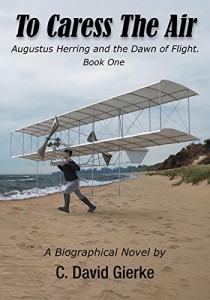
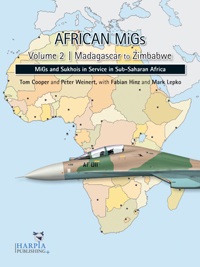

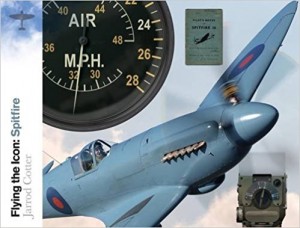
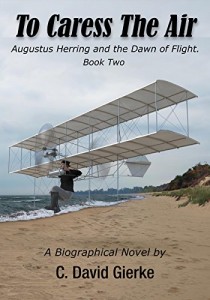
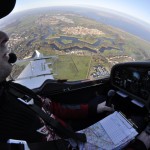
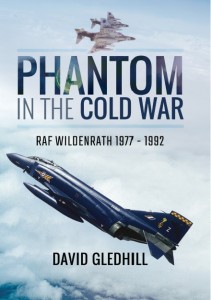
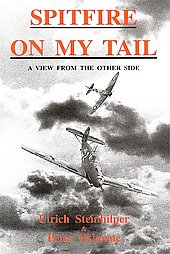
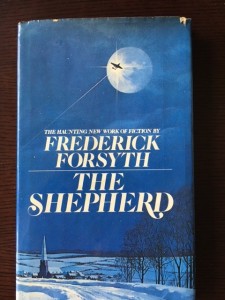


Excellent Book, well written, but then Forsyth can write….I own all his books, most of them read several times.
An excellent review of an excellent story. I first read it when I was in the Navy and it has always been a favorite. My wife and I now have a Christmas tradition where I read it every Christmas Eve. This year I acquired a 1/100th scale Mosquito, and a 1/100th scale Vampire and am turning them into ornaments for the tree.